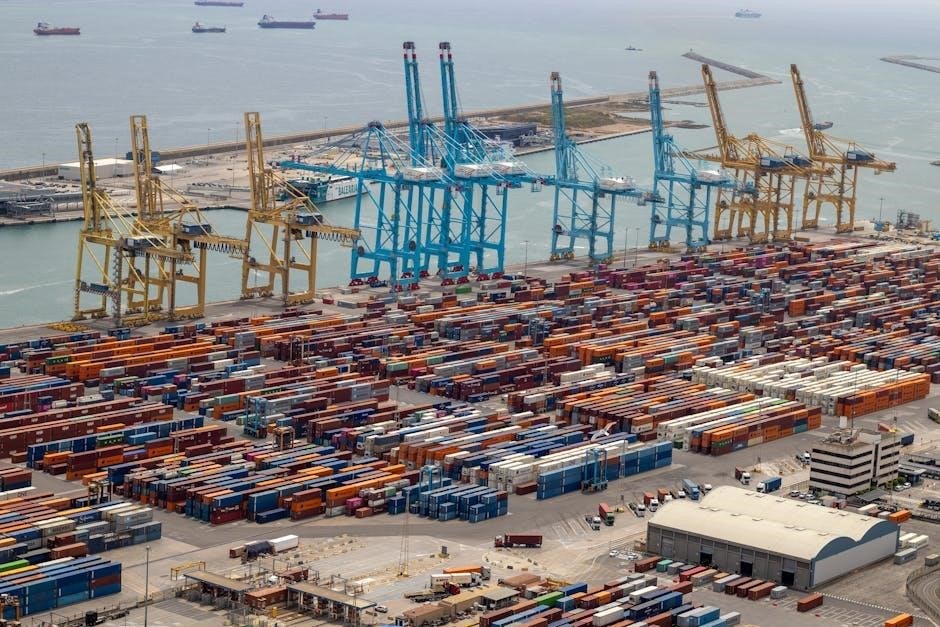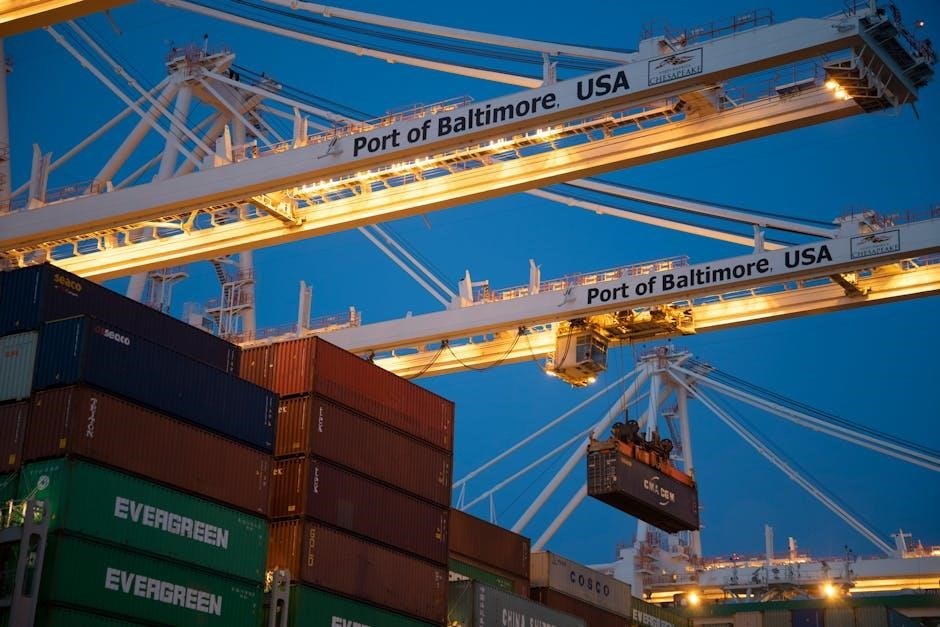A shippers list is a crucial tool for freight brokers, connecting them with reliable shippers and streamlining logistics. It helps brokers identify potential clients, understand shipping requirements, and build strong business relationships. In 2023, this resource remains essential for navigating the competitive freight industry, ensuring efficient operations and sustained growth.
1.1 What is a Shippers List?
A shippers list is a comprehensive database containing detailed information about potential shippers, including company names, contact details, and shipping requirements. It serves as a vital resource for freight brokers to identify and connect with businesses needing transportation services. The list typically includes freight volume, preferred routes, and specific logistics needs, enabling brokers to match carriers with shippers efficiently. By leveraging this data, brokers can streamline operations, improve efficiency, and foster long-term partnerships, ultimately driving business growth in the competitive freight industry.
1.2 Importance of a Shippers List for Freight Brokers
A shippers list is indispensable for freight brokers as it provides direct access to potential clients, enabling efficient load matching and operational streamlined. By offering insights into shipping patterns and requirements, it helps brokers identify opportunities, build relationships, and secure consistent freight volumes. This resource is critical for maintaining competitiveness, optimizing logistics, and ensuring sustainable growth in the dynamic freight industry. A well-curated shippers list empowers brokers to deliver reliable services, fostering trust and long-term partnerships with shippers.

Sources to Find Shippers List for Freight Brokers
Freight brokers can acquire shippers lists through online platforms, industry directories, and reports. Tools like DAT and Truckstop provide access to verified shipper information, enhancing operational efficiency.
2.1 Online Platforms and Directories
Online platforms and directories are essential resources for freight brokers to find shippers. Websites like DAT Freight & Analytics and Truckstop provide access to extensive databases of shippers, offering real-time freight data and load boards. These tools enable brokers to identify potential shippers, view their shipping history, and connect directly. Additionally, platforms like FreightWaves and the Transportation Intermediaries Association (TIA) offer directories and forums where brokers can network and gain insights. These resources streamline the process of building a reliable shippers list, ensuring efficiency and growth in brokerage operations.
2.2 Industry Reports and Publications
Industry reports and publications provide valuable insights for freight brokers to identify shippers. Resources like DAT Freight & Analytics and FreightWaves publish detailed reports on shipping trends, freight volumes, and carrier preferences. These documents often include lists of top shippers, their locations, and shipping patterns. Additionally, publications from the Transportation Intermediaries Association (TIA) and logistics journals offer actionable data. By analyzing these reports, brokers can pinpoint potential shippers and tailor their services to meet specific needs, enhancing their competitive edge in the market.

Key Elements of a Shippers List
A shippers list includes company names, contact details, freight volume, and specific shipping requirements. These elements help brokers match carriers with shippers efficiently, ensuring smooth operations.
3.1 Company Names and Contact Information
A shippers list typically includes detailed company names and accurate contact information, such as phone numbers, email addresses, and physical locations. This data ensures freight brokers can quickly identify and connect with potential shippers. Verifying this information is crucial for maintaining reliable communication and building trust. Accurate contact details also facilitate efficient coordination of shipments, making it easier for brokers to negotiate and secure hauling contracts. This section is vital for streamlining operations and ensuring seamless collaboration between brokers and shippers in the logistics process.
3.2 Freight Volume and Shipping Requirements
A shippers list provides insights into freight volume and specific shipping requirements, such as shipment frequency, weight, and special handling needs. This information helps freight brokers match carriers with suitable capacity and capabilities. Understanding a shipper’s volume enables brokers to anticipate demand and plan resources effectively. Detailed shipping requirements ensure smooth operations, reducing delays and errors. Accurate data on freight volume and preferences is essential for building efficient logistics partnerships and meeting customer expectations in the competitive freight brokerage industry.

How to Build Relationships with Shippers
Building relationships with shippers requires trust, reliability, and understanding their unique needs. Regular communication, tailored solutions, and mutual goal alignment foster long-term partnerships and business growth.
4.1 Effective Communication Strategies
Effective communication is key to building strong relationships with shippers. Clear and consistent updates on shipments, transparent discussions about rates, and understanding their specific needs ensure trust. Regular check-ins, proactive issue resolution, and active listening demonstrate commitment. Tailoring communication to their preferences, whether through emails, calls, or reports, fosters collaboration. Providing detailed documentation and timely responses to inquiries strengthens credibility. Open dialogue about expectations and challenges helps align goals, ensuring mutual satisfaction and long-term partnerships.
4.2 Networking and Industry Events
Networking and industry events are vital for building relationships with shippers. Attending conferences, trade shows, and freight-specific meetups allows brokers to connect directly with shippers, understand their needs, and showcase services. Platforms like DAT Freight & Analytics provide insights into industry trends, aiding in tailored approaches. Engaging in these events fosters trust, visibility, and collaboration, helping brokers stand out in a competitive market and establish long-term partnerships with shippers.

Legal and Regulatory Considerations
Freight brokers must comply with federal, state, and industry-specific regulations, ensuring proper documentation and adherence to legal standards to avoid penalties and maintain operational integrity.
5.1 Necessary Documentation for Freight Brokerage
Freight brokers must maintain accurate and up-to-date documentation, including bills of lading, service contracts, and insurance certificates. Proper records ensure compliance with legal requirements and protect against disputes. Additionally, brokers must verify shipper and carrier credentials, adhering to FMCSA regulations and industry standards. Accurate documentation also facilitates smooth transactions, ensuring all parties understand their roles and responsibilities. Regular audits and digital organization of files are recommended to maintain operational efficiency and avoid legal complications in the competitive freight brokerage landscape.
5.2 Compliance with Transportation Regulations
Compliance with transportation regulations is critical for freight brokers to operate legally and avoid penalties. Brokers must adhere to FMCSA guidelines, ensuring proper licensing and insurance for carriers. Regulations also cover cargo securement, hours of service, and hazardous materials handling. Customs clearance and cross-border requirements add another layer of complexity. Non-compliance can result in fines, legal action, or loss of brokerage authority. Staying updated on changing regulations is essential to maintain operational integrity and build trust with shippers and carriers in the competitive freight industry landscape.

Challenges in Acquiring and Using Shippers List
Freight brokers face challenges in acquiring and using shippers lists, such as data accuracy issues and accessibility of up-to-date shipper information, which can hinder efficient operations.
6.1 Common Challenges Faced by Freight Brokers
Freight brokers often struggle with acquiring accurate and up-to-date shippers lists, as data can become outdated quickly. Additionally, shippers may be hesitant to share their information due to privacy concerns. Brokers also face challenges like limited access to reliable sources, high costs of premium lists, and the need to constantly verify shipper credentials. Furthermore, issues such as blacklisting by certain platforms and complex documentation requirements can hinder their operations. These challenges highlight the importance of leveraging trusted sources and maintaining strong relationships with shippers to ensure smooth logistics operations.
6.2 Strategies to Overcome These Challenges
To address these challenges, freight brokers should focus on building trust with shippers through transparent communication and reliable service. Utilizing verified online platforms and industry directories can help access accurate shippers lists. Regularly updating and verifying data ensures relevance and reduces errors. Additionally, attending networking events and leveraging freight brokerage software can enhance efficiency. Maintaining compliance with regulations and addressing documentation requirements proactively also mitigates risks. By adopting these strategies, brokers can overcome obstacles and strengthen their position in the competitive freight industry.

Role of Technology in Shippers List Management
Technology streamlines shippers list management by providing real-time data, automated updates, and efficient tracking tools. Freight brokerage software enhances operational efficiency and decision-making, ensuring accuracy and compliance with industry standards.
7.1 Freight Brokerage Software and Tools
Freight brokerage software and tools play a vital role in managing shippers lists efficiently. Platforms like DAT Freight & Analytics offer advanced features such as load boards, carrier portals, and lane analyzers to streamline operations. These tools enable brokers to match shipments with available capacity, track shipments in real-time, and analyze market trends. Automated systems reduce manual errors and improve communication between brokers and shippers, ensuring seamless transactions. Additionally, these tools provide data-driven insights, helping brokers make informed decisions and maintain a competitive edge in the logistics industry.
7.2 Impact of Digital Transformation
Digital transformation has revolutionized the management of shippers lists, enhancing efficiency and accuracy. Advanced technologies like automation, AI, and real-time tracking tools enable seamless communication and data sharing between brokers and shippers. Digital platforms provide instant access to updated lists, reducing manual errors and saving time. Predictive analytics and data-driven insights further optimize operations, helping brokers anticipate market trends and make informed decisions. This shift has streamlined logistics, improved customer satisfaction, and strengthened business relationships, making digital tools indispensable in modern freight brokerage.

Best Practices for Utilizing Shippers List
Regularly update and verify shippers list to ensure accuracy and relevance. Use ethical data practices, respecting privacy and compliance standards. Leverage technology for efficient list management and targeted outreach. Maintain clear communication with shippers to build trust and long-term partnerships. Analyze shipping requirements to tailor services effectively. Continuously monitor industry trends to adapt strategies and remain competitive. This structured approach maximizes the value of your shippers list, driving growth and success in freight brokerage operations.
8.1 Regular Updates and Verification
Regular updates and verification of shippers list are essential to maintain accuracy and relevance. Outdated information can lead to missed opportunities or operational delays. Verify contact details, shipping requirements, and preferences periodically. Use reliable sources or software tools to automate updates and ensure data integrity. This practice helps freight brokers align with shippers’ evolving needs, fostering stronger partnerships and seamless operations. Consistent verification also minimizes errors, ensuring compliance with legal and industry standards. Stay proactive to keep your shippers list current and actionable for optimal brokerage performance.
8.2 Ethical Considerations in Data Usage
Ethical considerations in using shippers lists involve respecting privacy laws and data protection regulations. Freight brokers must ensure they comply with GDPR, CCPA, and other relevant laws when handling shippers’ information. Obtaining consent before using or sharing data is crucial to maintain trust. Additionally, brokers should avoid unauthorized sharing of sensitive details and ensure transparency in how data is used. Secure storage and encryption of shippers’ information are necessary to prevent breaches. Adhering to these principles fosters ethical practices, safeguards relationships, and ensures legal compliance in the freight brokerage industry.

Future Trends in Freight Brokerage and Shipping
The future of freight brokerage and shipping will focus on automation, AI, and big data analytics, enhancing efficiency and decision-making across the supply chain.
9.1 Emerging Technologies in Freight Brokerage
Emerging technologies like artificial intelligence, blockchain, and IoT are transforming freight brokerage by enhancing load matching, real-time tracking, and predictive analytics. Automation tools streamline operations, improving efficiency and reducing costs. Digital platforms now enable seamless communication between shippers and carriers, fostering transparency and trust. These advancements not only optimize logistics but also empower brokers to make data-driven decisions, ensuring scalability and adaptability in a rapidly evolving industry.
9.2 Predictions for the Freight Industry in 2023 and Beyond
The freight industry is expected to see significant growth in 2023, driven by rising demand for efficient logistics solutions. Predictions include increased adoption of digital tools, such as AI and IoT, to enhance operational efficiency. Sustainability will play a key role, with more shippers prioritizing eco-friendly practices. Additionally, supply chain transparency and real-time monitoring are anticipated to become standard, enabling better decision-making. As the industry evolves, freight brokers who adapt to these trends will be well-positioned to thrive in a competitive market.
